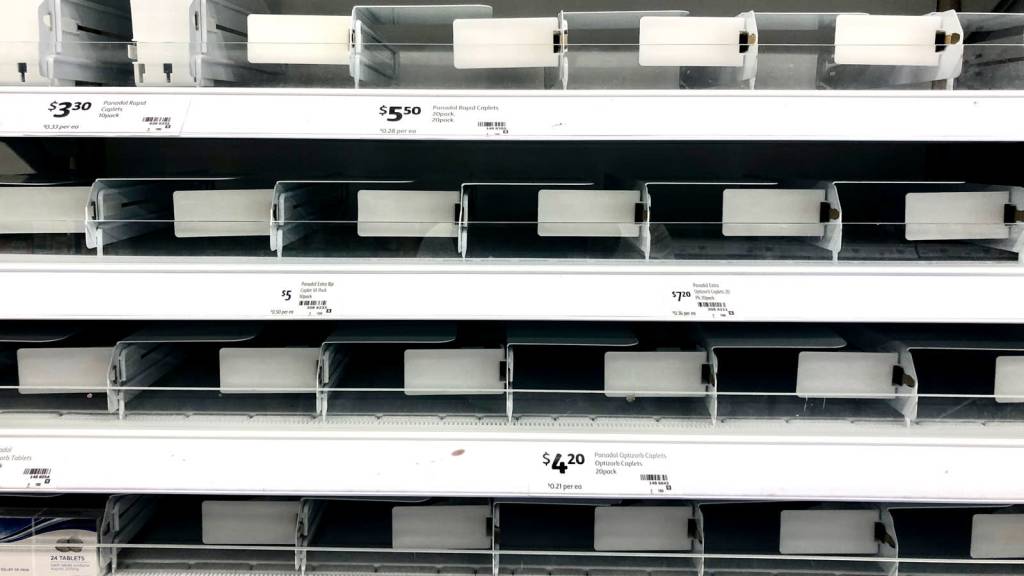While the spread of coronavirus on a global scale is undoubtedly scary, the media hype surrounding the disease has caused extreme anxiety and hysteria.
So much so that supermarkets copped the brunt of the panic this week with shoppers buying out items like toilet paper, paracetamol and canned goods. Images of empty shelves in Woolworths and Coles stores across the country shows just how stressed Australians are.
In response to this sweep of panic buying, Woolworths have now limited the amount of toilet paper customers can buy. According to SBS, they have capped it at four packs per person.
Hand sanitiser has also been selling out across supermarkets and pharmacies and mask-wearing people are commonplace on trains.
But, health authorities are urging people to stop buying or wearing masks.
What’s the problem with wearing a mask?
According to The New York Times, medical experts don’t think that masks are actually that effective for members of the public.
And, the panic buying of masks is actually having a negative effect on the healthcare industry. There are major concerns about the number of supplies available for healthcare workers, who actually need the protective gear.
“There are severe strains on protective equipment around the world,” said Dr. Michael J. Ryan, executive director of the health emergency program at the World Health Organisation (WHO) during a recent briefing.
“Our primary concern is to ensure that our front line health workers are protected and that they have the equipment they need to do their jobs.”
Dr. Ryan also emphasised the limitations of masks in actually protecting you from COVID-19.
“There are limits to how a mask can protect you from being infected,” he said. “The most important thing everyone can do is wash your hands, keep your hands away from your face and observe very precise hygiene.”
Who should be wearing masks?
According to the WHO, you should only be wearing a mask if you’re taking care of someone with suspected COVID-19 or if you’re feeling unwell yourself. Otherwise, masks should be solely reserved for healthcare workers.
If you’re healthy, it’s not necessary to wear a mask.
When to use mask 😷
• If you are healthy, you only need to wear a mask if you are taking care of a person with suspected #coronavirus infection.
• Wear a mask if you are coughing or sneezingMore https://t.co/4odGgqxAKP#COVID19 pic.twitter.com/1aM8MyaSmF
— World Health Organization (WHO) (@WHO) March 1, 2020
If you do choose to wear a mask, there is a hygiene process that comes along with it.
According to the WHO, you must properly apply the mask to your face and then dispose of it correctly after wearing. Whilst wearing the mask, it’s also important to avoid touching your face.
Celebrities have also jumped on the mask-wearing train, especially when they travel. While travelling brings its own set of germs, it’s important to keep perspective.
If you’re a frequent traveller, do wash your hands habitually and pay attention to your personal hygiene. But, if you’re really worried, an N95 mask (as seen on Gwyneth Paltrow below) is your best bet. According to NSW Health, these masks are able to filter out fine particles from the air when worn correctly.
While the effectiveness of N95 masks against coronavirus is unknown, it could provide a little more peace of mind while travelling.
Otherwise, if you’re simply going about your daily life — catching public transport, going to work and socialising with friends — wearing a mask is probably not necessary.
The Australian Government Department of Health recommends the following steps to help prevent the spread of coronavirus:
- Wash your hands frequently with soap and water, before and after eating, and after going to the toilet
- Cover your cough and sneeze, dispose of tissues, and use alcohol-based hand sanitiser
- If unwell, avoid contact with others (touching, kissing, hugging, and other intimate
contact.)
So, in short: wash your hands, friends! We should all be doing this anyway, c’mon.
The current health crisis is evolving rapidly. If you suspect you or a family member has coronavirus you should call (not visit) your GP or ring the national Coronavirus Health Information Hotline on 1800 020 080.
Read more stories from TheLatch— and follow us on Facebook.

